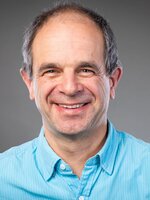
Agriculture, the timber industry, fishing, local supply - everywhere the extinction of small businesses is lamented. Trust in these enterprises is high. Yet, from a scientific point of view, there is no evidence that small farms are fundamentally better or more sustainable than large farms, neither from an environmental nor from an animal welfare point of view. Where does this emotional affection for small farms come from, when even organically managed farms are sometimes very large? Do large structures also have advantages?
"The alienation of the population from agriculture is growing. And I believe that this is one of the reasons why such unease arises. Where does our food actually come from? Who is behind it?"
Dr. Stefan Mann, Agroscope, Switzerland
With his book "Small is beautiful: Economics as if People Mattered", the economist Ernst Friedrich Schumacher is considered one of the pioneers of sustainability. He held the view that "the production of local inputs for local needs is the most rational way of doing business".
Based on this doctrine, regionalisation and a production of food in rather small agricultural units are favoured in terms of a sustainable agricultural economy. Large farms and industrialisation in agriculture, on the other hand, are viewed sceptically. In other areas, too, such as fishing or local supply, consumers often trust small farms per se. However, from an economic-rational and scientific point of view, there is no generally valid evidence that small farms are the better ones, neither from an environmental nor from an animal welfare point of view.
In this episode, our guests Stefan Mann from the Swiss Agroscope Institute and Bernhard Forstner from the Thünen Institute for Farm Economics explore the question of where the reservations about large-scale structures in agriculture come from and why small farms are often perceived as the better farmers. They question whether such a generalisation makes sense and is in keeping with the times, and what social and cultural roles large and small farms take on in agriculture, for example. They plead for a diversity of farm structures and show ways in which sustainability is also possible on conventionally managed farms.
Sources and further readings
- Mann S (2022): Postletale Landwirtschaft. Zur anstehenden Reform unseres Agrarsystems, Wiesbaden, doi.org/10.1007/978-3-658-37967-4
- Forstner B, Zavyalova E (2016): Small is beautiful? Was wissen wir überhaupt noch über die Betriebsstrukturen in der Landwirtschaft und deren Vielfalt? In: Small is beautiful? Betriebsgrößen und multifunktionale Landwirtschaft. Rehburg-Loccum: Evangelische Akademie. S. 49–64. (= Loccumer Protokolle)
- Nieberg H, Forstner B (2019): Agrarstrukturentwicklung - Bestimmende Faktoren und Perspektiven. Landentwickl Aktuell 24:65-67
- Eigentumsstrukturen in der deutschen Landwirtschaft: Thünen-Report 85
- Studie zu Eigentumsverhältnissen in Bayern: Thünen-Report 99

Dr. Stefan Mann is an agricultural economist and political economist. The expert on structures in agriculture is intensively involved in transformation processes. Since 2002 he has headed the Socioeconomics Research Group of the Swiss research institution Agroscope in the Federal Department of Economic Affairs.

Agricultural engineer Bernhard Forstner conducts research at the Thünen Institute of Farm Economics on agricultural and business structures, specifically on their farm diversity and change. He is also an expert on EU agricultural policy and analyses the potential of investment aid and other subsidies in this field.







Comments (0)
No comments found!